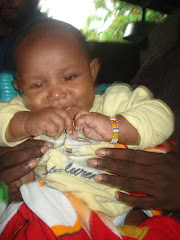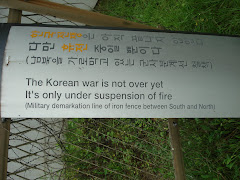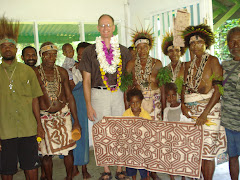Sunday, March 9, 2014
Vanga Point
This weekend Br. Clifton Henry, the Minister Provincial and I went to Gizo in the west of the country, to visit a brother living and studying at Vanga Point a Rural Training Center run my the Marists Brothers.
Our flight from Honiara was uneventful--thank goodness. We arrived at Gizo Airport--it is an island all to itself, the airstrip and buildings cover the whole island. A boat takes passengers to a larger island where the small town of Gizo is located. You get off the boat right in front of the Gizo Hotel. The open air market is there too. So Clifton and I loaded up on a huge supply of potatoes, papaya, cabbage, eggplants and other vegetables , then bought a dozen fish. By this time the brothers and students from the Training Center sent over to get us had arrived and we loaded up and headed across the open sea. It is about an hour to cross. Although the sun was shining, the sea was rough. Twice the engine stalled. I kept repeating, mantra-like: "Not to worry, not to worry! These guys are mechanics!" They proved to be at least resourceful boaters; the second time the engine stalled they ripped the straps off one of the two life jackets to bind the engine together more tightly (I think that is what they did...). I used the rest of the life jacket as a cushion to soften the thumps on my behind.
Vanga Training Center is a rough looking place. The tsunami a year ago took out the wharf, and it hasn't been replaced. The classrooms and outbuildings are rusted and partially collapsed. Everywhere there is rusted out machinery, overgrown fields and paddocks. But there are about 130 eager young men there, and the SSF house is right in the middle of campus, next to the chapel. It is home to Br. Selwyn Tione and former brother Ezekiel Kelly. There are about 25 Anglican students in this Roman Catholic place, and they were very excited to have us visit. They came by all evening to meet us and sit and "story." First on their list of events for us was an Anglican Eucharist Saturday morning. But since it was to be held at the usual Saturday prayer time, 6:00 a.m., attendance was compulsory for all students. Clifton celebrated in a whisper, which I thought was a bit perverse in an huge open air chapel with 130 people there, but nobody seemed to mind. The Anglican students sang out the responses with intensity. They all like my homily, and were quite gleeful that I was the first white visitor to speak pijin fluently.
After Mass and breakfast a small group of us headed out to explore, and ended up hiking several hours through the jungle. We reached the house of a local family who gave us pommelos (gargantuan grapefruits) to eat on the beach. Back at the training center we had lunch with the assistant principal and his wife, and then went for a swim in the bay. Later we watched the students play soccer. A cataclysmic thunder and lightening storm ended the play, and I was glad for a rest. At six we were back in Chapel for the Roman Catholic Mass. Since we all use the same lectionary, it was practically duplicate of the morning--except the preacher didn't have an American accent. Its hard not to think about the sadness of the divisions that separate two traditions that are so very, very close. And then to think about the validity of the differences and to be glad I am an Episcopalian...
Following the Eucharist Clifton and I were to give "encouragements" to the students. I wasn't sure what this was expected to be so let Clifton go first. He gave a part testimonial, part pep talk. So I followed suit, telling about my call as a student to seek ordination to the priesthood, and how that matured into a call to religious life. I then told them about how I nearly derailed on alcohol, and the joy of my life today. My pep talk consisted mostly of telling them the most important thing isn't what they become but the sense of dignity and self respect that they have about who they are, and their commitment to living honestly. The homely lessons of my life.
Finally it was dinner at nearly eight o'clock, then bed. All during the night excited groups of students were coming and going from the small friary. Selwyn had organized the long suffering Anglicans to prepare a feast for us, and all through the night they made traditional pudding, peeled tons of sweet potatoes, and a group of 5 went diving and caught quite a number of fish. They absolutely did not want us to help--it was to be a sort of surprise, I think. Or at least a way of honouring us.
After yet another Eucharist we ate our feast. One of the Marist brothers came, the Principal and assistant, and all of the Anglicans. It was quite a happy time. A number of them finally summoned the courage to speak with me directly and I was very touched by their reciprocal testimonials and expressions of gratitude for our visit.
All too soon it was time to go. We boarded the boat and pounded our way back across the bay, getting soaked with spray, so I had to get them to take me to a local friend's house to change my clothes. Then over to the airport island, and back to Honiara.
Our flight from Honiara was uneventful--thank goodness. We arrived at Gizo Airport--it is an island all to itself, the airstrip and buildings cover the whole island. A boat takes passengers to a larger island where the small town of Gizo is located. You get off the boat right in front of the Gizo Hotel. The open air market is there too. So Clifton and I loaded up on a huge supply of potatoes, papaya, cabbage, eggplants and other vegetables , then bought a dozen fish. By this time the brothers and students from the Training Center sent over to get us had arrived and we loaded up and headed across the open sea. It is about an hour to cross. Although the sun was shining, the sea was rough. Twice the engine stalled. I kept repeating, mantra-like: "Not to worry, not to worry! These guys are mechanics!" They proved to be at least resourceful boaters; the second time the engine stalled they ripped the straps off one of the two life jackets to bind the engine together more tightly (I think that is what they did...). I used the rest of the life jacket as a cushion to soften the thumps on my behind.
Vanga Training Center is a rough looking place. The tsunami a year ago took out the wharf, and it hasn't been replaced. The classrooms and outbuildings are rusted and partially collapsed. Everywhere there is rusted out machinery, overgrown fields and paddocks. But there are about 130 eager young men there, and the SSF house is right in the middle of campus, next to the chapel. It is home to Br. Selwyn Tione and former brother Ezekiel Kelly. There are about 25 Anglican students in this Roman Catholic place, and they were very excited to have us visit. They came by all evening to meet us and sit and "story." First on their list of events for us was an Anglican Eucharist Saturday morning. But since it was to be held at the usual Saturday prayer time, 6:00 a.m., attendance was compulsory for all students. Clifton celebrated in a whisper, which I thought was a bit perverse in an huge open air chapel with 130 people there, but nobody seemed to mind. The Anglican students sang out the responses with intensity. They all like my homily, and were quite gleeful that I was the first white visitor to speak pijin fluently.
After Mass and breakfast a small group of us headed out to explore, and ended up hiking several hours through the jungle. We reached the house of a local family who gave us pommelos (gargantuan grapefruits) to eat on the beach. Back at the training center we had lunch with the assistant principal and his wife, and then went for a swim in the bay. Later we watched the students play soccer. A cataclysmic thunder and lightening storm ended the play, and I was glad for a rest. At six we were back in Chapel for the Roman Catholic Mass. Since we all use the same lectionary, it was practically duplicate of the morning--except the preacher didn't have an American accent. Its hard not to think about the sadness of the divisions that separate two traditions that are so very, very close. And then to think about the validity of the differences and to be glad I am an Episcopalian...
Following the Eucharist Clifton and I were to give "encouragements" to the students. I wasn't sure what this was expected to be so let Clifton go first. He gave a part testimonial, part pep talk. So I followed suit, telling about my call as a student to seek ordination to the priesthood, and how that matured into a call to religious life. I then told them about how I nearly derailed on alcohol, and the joy of my life today. My pep talk consisted mostly of telling them the most important thing isn't what they become but the sense of dignity and self respect that they have about who they are, and their commitment to living honestly. The homely lessons of my life.
Finally it was dinner at nearly eight o'clock, then bed. All during the night excited groups of students were coming and going from the small friary. Selwyn had organized the long suffering Anglicans to prepare a feast for us, and all through the night they made traditional pudding, peeled tons of sweet potatoes, and a group of 5 went diving and caught quite a number of fish. They absolutely did not want us to help--it was to be a sort of surprise, I think. Or at least a way of honouring us.
After yet another Eucharist we ate our feast. One of the Marist brothers came, the Principal and assistant, and all of the Anglicans. It was quite a happy time. A number of them finally summoned the courage to speak with me directly and I was very touched by their reciprocal testimonials and expressions of gratitude for our visit.
All too soon it was time to go. We boarded the boat and pounded our way back across the bay, getting soaked with spray, so I had to get them to take me to a local friend's house to change my clothes. Then over to the airport island, and back to Honiara.
Subscribe to:
Post Comments (Atom)






No comments:
Post a Comment